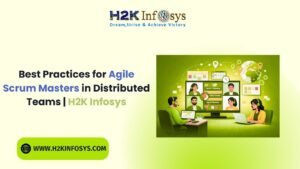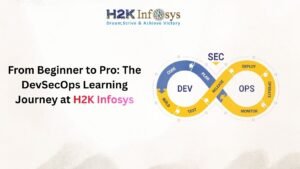Salesforce is one of the most in-demand platforms for managing customer relationships and streamlining business operations. Many professionals from non-technical or IT backgrounds, such as quality analysts, business analysts, or even Scrum Masters, are transitioning into Salesforce roles due to the vast opportunities available in the ecosystem.
If you’re curious about how to become a Salesforce Admin without prior IT experience, you’re in the right place. In this guide, I’ll walk you through a step-by-step process to build a career as a Salesforce Administrator and earn your Salesforce Admin Certification.
Why Choose a Career as a Salesforce Administrator?
Before jumping into how to become a Salesforce Administrator, let’s explore why this role is highly desirable and why it’s suitable even for those without an IT background.
1. High Demand for Salesforce Admins
IT Background Salesforce is the leading CRM platform globally, used by companies of all sizes. With businesses increasingly adopting Salesforce, the demand for skilled Salesforce Admins continues to grow. This presents a huge opportunity for professionals looking to enter a tech-related field without coding expertise.
2. Lucrative Salary and Career Growth
The average IT Background salary of a Salesforce Admin ranges from $70,000 to $100,000 annually, depending on experience and location. Beyond the salary, there are significant opportunities for career advancement into roles like Salesforce Consultant, Solution Architect, and Salesforce Developer.
3. No Coding Required
Unlike many other tech roles, becoming a IT Background Salesforce Administrator doesn’t require deep programming knowledge. Most of the tasks revolve around managing Salesforce configurations, automations, data management, and user training.
4. Flexibility and Remote Work Opportunities
One of the most appealing aspects of becoming a Salesforce Administrator is the flexibility it offers. With the rise of remote work, many organizations are adopting cloud-based solutions to manage their operations, and Salesforce is at the forefront of this transition. As a IT Background Salesforce Admin, you can work from anywhere in the world, making it an ideal career choice if you’re seeking work-life balance or location independence.
5. Diverse Industry Applications
IT Background Salesforce is not limited to a single industry. From healthcare and finance to retail and education, organizations across the globe rely on Salesforce to manage customer relationships, streamline workflows, and gain business insights. This means that as a Salesforce Admin, your skills will be valuable in various domains, allowing you to switch industries without needing to learn a completely new toolset.
To get started IT Background with Salesforce, first understand that it is a powerful CRM platform designed to manage customer information, sales processes, and service operations. After logging in to the Lightning Experience, you can organize daily work, manage customer data through standard objects like Accounts and Contacts, create reports and dashboards for better visibility, and use guided learning resources to customize Salesforce according to business requirements.
Getting Started
Access the Platform: Sign up for a free trial or use your company credentials to log in to the Lightning interface.
Explore the Homepage: The homepage provides a snapshot of important updates and can be personalized with components such as recent records, tasks, and activity summaries.
Learn Core Objects: Become familiar with Accounts (organizations), Contacts (individuals), Leads (prospects), Opportunities (sales deals), and Cases (customer support requests).
Daily Workflows
Task Management: Schedule and monitor calls, meetings, and follow-ups using the Activity Timeline.
Data Management: Capture leads, convert them into accounts and contacts, and record interactions to maintain a complete customer history.
Sales Tracking: Move opportunities through sales stages to monitor deal progress.
Customer Support: Create and manage cases to resolve customer issues efficiently.
Essential Features
Reports and Dashboards: Generate custom reports and display them on dashboards to gain quick, actionable insights.
Global Search: Instantly locate records across the system using Salesforce’s unified search.
Personalization and Customization: Adjust fields, page layouts, and apps to match user roles and business needs.
Automation: Use tools like Flows to automate approvals, updates, and routine business processes.
Salesforce Trailhead, the official learning platform, provides free, interactive modules for administrators, developers, and end users, covering everything from IT Background CRM fundamentals to advanced automation and AI-driven capabilities.
Step 1: Understand the Salesforce Admin Role
The first step in your journey is to fully understand the responsibilities of a Salesforce Admin. Here’s a quick breakdown of what the role involves:
Key Responsibilities of a Salesforce Administrator
- Configuring Salesforce to meet business needs
- Managing user accounts, roles, and permissions
- Creating and maintaining workflows, process builders, and automation
- Generating reports and dashboards
- Managing data security and integrity
- Providing user support and training
The core responsibility of a Salesforce Admin is to ensure the smooth functioning of the platform and maximize its usage within the organization.
Step 2: Learn the Basics of Salesforce
Before preparing for the IT Background Salesforce Admin Certification, you must familiarize yourself with Salesforce basics. Here’s how to get started:
Key Concepts to Learn:
- Objects and Fields: Understand the core structure of Salesforce, including standard and custom objects.
- Data Management: Learn how to import/export data and maintain data integrity.
- User Management: Explore roles, profiles, and permission sets.
- Automation: Familiarize yourself with automation tools like Workflow Rules, Process Builder, and Flow.
You can begin by exploring Salesforce’s official learning platform or free community resources. The goal is to get comfortable navigating the Salesforce interface.
Step 3: Prepare for the Salesforce Admin Certification
Earning your Salesforce Admin Certification is a key milestone that validates your knowledge and skills as a Salesforce Administrator. Here’s how to prepare for the exam:
What is the Salesforce Admin Certification?
The Salesforce Administrator Certification is an entry-level credential designed for individuals who want to demonstrate their proficiency in managing and configuring Salesforce.
Exam Overview:
- Format: Multiple-choice questions
- Duration: 105 minutes
- Passing Score: 65%
- Cost: $200
Key Topics to Focus On:
- Salesforce configuration and setup
- Object Manager and Lightning App Builder
- User setup and security
- Workflow automation
- Data management and reporting
Study Tips:
- Follow a Study Plan: Create a structured study plan and dedicate a set number of hours per week to your preparation.
- Use Practice Exams: Take mock tests to gauge your understanding of the topics.
- Join Salesforce Communities: Engage with the Salesforce community to get insights, tips, and support.
Step 4: Gain Hands-On Experience with Salesforce
To become a successful IT Background Salesforce Administrator, hands-on practice is essential. Here are some ways to get practical experience:
1. Create a Free Salesforce Developer Account
IT Background Salesforce offers a free Developer Edition account that you can use to practice. This account provides access to all the core features you’ll need to learn as a Salesforce Admin.
2. Work on Real-Life Scenarios
Simulate real-life business scenarios and practice configuring Salesforce to meet specific business needs. This will help you get comfortable with workflows, automations, and security settings.
3. Volunteer for Salesforce Projects
IT Background If you’re transitioning from a non-technical role, consider volunteering for Salesforce projects in your current organization or through non-profit organizations. This experience will be invaluable for your resume.
Step 5: Build a Strong Resume and LinkedIn Profile
Once you’ve gained some hands-on experience and earned your Salesforce Admin Certification, it’s time to showcase your skills to potential employers.
Resume Tips:
- Highlight your Salesforce Admin Certification prominently.
- Focus on your hands-on experience with Salesforce tools.
- Mention any volunteer projects or real-life scenarios you’ve worked on.
LinkedIn Tips:
- Update your LinkedIn profile to reflect your new skills and certification.
- Connect with Salesforce professionals and join relevant groups to network and learn about job opportunities.
Step 6: Apply for Salesforce Admin Jobs
Where to Find Job Opportunities
- Salesforce Job Board: Directly from Salesforce’s career portal.
- LinkedIn Jobs: Apply for roles in various industries.
- Indeed and Glassdoor: Regularly updated with Salesforce Admin positions.
- Freelance Platforms: Start as a freelance Salesforce Admin to gain experience.
Acing Your Job Interview
During interviews, employers look for both technical proficiency and problem-solving skills. Here are some common interview questions to practice:
- How do you manage user access and permissions?
- Describe a situation where you implemented an automation solution.
- How do you ensure data integrity within Salesforce?
Prepare to demonstrate your problem-solving approach with specific examples from your hands-on practice or volunteer work.
Step 7: Continue Learning and Growing
Stay Updated with Salesforce Releases
Salesforce frequently updates its IT Background platform with new features and enhancements. Make it a habit to follow release notes and participate in webinars to stay informed.
Join Salesforce User Groups
Local user groups and online communities are excellent platforms to:
- Exchange Knowledge: Share tips and experiences with fellow professionals.
- Stay Inspired: Learn from case studies and success stories.
- Get Mentorship: Connect with seasoned Salesforce experts for guidance.
Success Story: From Non-Tech to Salesforce Admin
Take inspiration from professionals who transitioned into Salesforce roles without an IT background:
- Rebecca, Former QA Analyst: After learning Salesforce on Trailhead and volunteering at a non-profit, Rebecca secured a full-time Salesforce Admin role.
- Michael, Business Analyst: Leveraging his analytical skills and gaining certification, Michael made a successful switch, landing a role in a healthcare company.
Final Thoughts: Your Path to Becoming a Salesforce Admin
Transitioning to a career as a Salesforce Administrator is achievable even if you have no prior IT background. The key is to follow a structured learning path, earn your Salesforce Administrator Certification, and gain hands-on experience.
With dedication and persistence, you can build a successful career in the Salesforce ecosystem, enjoying job security, career growth, and financial stability.
Conclusion: Seize Your Salesforce Future
Becoming a Salesforce Admin without a technical background is not only possible but also rewarding. By following the structured steps outlined in this guide, you’ll build the knowledge, hands-on experience, and confidence needed to succeed. IT Background Whether you’re transitioning from a non-IT role or looking to upskill, the opportunities are vast and promising.
So, take that first step today. Start your learning journey, earn your certification, and open the door to a thriving career as a Salesforce Administrator!
So, what are you waiting for? Start your Salesforce journey today and take control of your career!
Frequently Asked Questions (FAQs)
Q: Do I need coding skills to become a Salesforce Admin?
A: No, coding is not required for the Salesforce Admin role. However, understanding automation tools and basic configurations is essential.
Q: How long does it take to become a certified Salesforce Admin?
A: It typically takes 3-6 months of dedicated learning and practice to prepare for the Salesforce Admin Certification exam.
Q: Is the Salesforce Admin Certification worth it?
A: Yes, earning your Salesforce Admin Certification validates your skills and makes you a competitive candidate in the job market.
This guide should give you a clear roadmap to becoming a Salesforce Administrator with no prior IT Background experience. Follow these steps, stay consistent, and you’ll soon be on your way to a rewarding career in Salesforce!













![Understanding the Significance of [1] in Python: A Comprehensive Guide](https://www.h2kinfosys.com/blog/wp-content/uploads/2024/08/programming-background-with-html-1-300x200.webp)









![Understanding the Significance of [1] in Python: A Comprehensive Guide](https://www.h2kinfosys.com/blog/wp-content/uploads/2024/08/programming-background-with-html-1-1024x684.webp)



